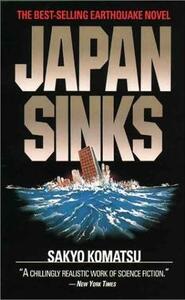Take a photo of a barcode or cover
sad
tense
medium-paced
Plot or Character Driven:
Plot
Strong character development:
No
Loveable characters:
No
Flaws of characters a main focus:
No
Japan Sinks
Author: Sakyo Komatsu
Translated by: Michael Gallagher
=======================
REVIEW CONTAINS SPOILERS
_________________
The Feel:
When the scientists get rolling in their research with the government’s quiet help, there is an Independence Day feel, complete with impending doom thrown in.
Least Favorite Character:
Too many characters exist in this book only as titles. Onodera and Professor Tadokoro are the only ones who get any characterization at all. Japan is treated like a character in itself, which isn’t necessarily bad. But the title only characters appear in too many scenes and have too much import to the overall story to just be that. Of course, again, I’m left to wonder if that is a function of the translation more than the actual author…or if that is a commonality in Japanese literature.
Bechdel Test:
There were female characters. Two whole named female characters in the whole book. They appear to only be in the book for the main character to play off of. And neither Reiko or Mako have interacted with each other. And have barely appeared at all. They seem to only appear as framing elements for Onodera’s character.
Plot Holes/Out of Character:
Onodera is a smart person. He’s seen the signs before the scientists start spelling them out. On some level, he should know what seems to be happening.
Uhm Moments:
Awkward prearranged matchmaking by Yoshimura, his boss, leading to a tryst on the beach with the assumed fiance, Reiko Abe…after being taken to a business man’s bar…it’s an odd scene and an odd set of circumstances. And Onodera seems to be accepting it as par for the course, if he expects to advance in the company, he has to play the game as it is set up by the old boy network in control of the country and times. And the woman’s father begging Yoshimura to find her a husband. The guy at the party going “oh dear, not again” when she announces that she’s going swimming and takes Onodera along makes me wonder if Onodera isn’t the first potential suitor who has been invited to the seaside house where the wealthy are plotting an undersea amusement park and Onodera’s boss is playing hamfisted matchmaker. Like I said, odd frigging set of scenes.
Uhm, sex in the ocean between two people who just met, at a party where one of them’s guardian, who is also the other one’s boss, introduces them and intimates that they should marry, and at the culmination of the act they hear that a coworker has committed suicide and then a volcano across the bay erupts without warning. … … …uhm…yeah. I wonder if this is how it was presented in the original Japanese or if this is a product of poetic license, mashing events together through translation, to make them more related and Americanized? And this is on the heels of the previous odd set of scenes that I mentioned.
Them overworking the French, secondhand, deep sea submersible puts me in mind of the deeply stupid, Titanic, tourist, deep sea submarine that popped.
A Path I Can’t Follow:
Don’t like the author fridging Reiko to give Onodera inspiration to throw himself into rescue work like a man with a deathwish. Don’t like what appears to have happened to Onodera either.
Suspension of Disbelief:
Of course, Mako keeps just popping up. In a story with a 110 million characters or so, she just happens to be at the right place at the right time to run into Onodera on three separate occasions.
Turd in the Punchbowl:
Translators doing dedications at the front of books they translated feels off.
Dropped Threads:
Reiko and Onodera reconnecting after events were well advanced…and, then her almost immediately falling, seeming, victim to a volcanic eruption, as they sweep across and around Japan.
Onodera reconnecting with his friend from the submersible research company where he worked before Plan D. And making plans for them to work together again on the dives that would use the deep sea submersible that they had worked on together…only for that character to never appear again.
Your ~ism is Showing:
The ism is strong. Whether it is original Japanese text or a product of the translator, it is there. Referring to the Polynesian fishermen who witnessed the island sinking as simple people of nature due to the language barrier is disrespectful bushwa.
Juxtaposition:
The juxtaposition of wealthy, bored, tired, world-weary Reiko, the socialite who had sex with a man her ward had just introduced to her as a potential fiancee and the bar hostess Mako who comes across happy-go-lucky and interested in what Onodera is involved in, but could be that way with every potential tipper sho she comes across. Reiko rings as a deeper, more real character while Mako is more of a straw woman moving the plot along but being a mirror for the male character or furniture.
As I reach the point in the book where the studies of the disaster have advanced to the point where the scientists and the in-the-know politicians see that the onrushing apocalypse is real and not the intuitions and ramblings of a mad scientist, I see on the BBC that it is the anniversary of the Hiroshima atomic bombing. I have such an eerie feeling right now.
Logic Gaps:
Onodera, a reputedly smart individual, should’ve made the leap of logic based on what his friend on the train intimated to him about the engineering project that he was on his way to resurvey and the island he was over…former island. No guarantee that he won’t make the leap later, but the clues are being spoonfed to him and they should be ringing alarm bells sooner rather than later.
The Unexpected:
The scene flip with Onodera, escape from the bottom of the Japan Trench to the office drama in Tokyo, is jarring.
Calling the Ball:
Bet Onodera’s boss is pissed at him. After pulling him aside, plying him with drinks, intimates that there is a big promotion coming up in the company for him, trying to marry him off to his ward, who Onodera has sex with in the ocean while a business party with many investors is going on in the house…and he quits to go to work on a hush hush project that no one is talking about.
_________________
Pacing:
The rhythms of the words and language used in the translation remind me of the clippedness of kaiju movies roughly translated into English. Maybe it is a symptom of the translation process itself because it is still Japanese and English. Or is that just how the two languages interact in translation? It’s noticeable to me, but I wonder if it is just the way that I’m reading it as opposed to a feature of the translation or original writing.
Last Page Sound:
I liked it. There were issues, but I liked it.
Questions I’m Left With:
In our current world, is translating foreign books into other languages going to become the province of Artificial Intelligence? And how important are proofreaders going to become to keep the A.I. from doing the cranberry, with thanks to Jarvis and Iron Man.
medium-paced
Plot or Character Driven:
Plot
Strong character development:
No
Loveable characters:
No
Diverse cast of characters:
No
Flaws of characters a main focus:
No
I wish I could remember how I heard about this book but I can't. Maybe Big Data just knew I'd like it - fascinating story from the early 1970s filled with earthquakes and volcanoes and tidal waves and Japan sinking - with just under a year of warning, how do they evacuate 110 million people...and where do they go? Really complex, well thought out story. Reminded me of a book that I was given when I moved to San Francisco - "The Last Days of the Late Great State of California". And I can't believe that this is the same guy a who "Bye Bye Jupiter", a movie that was used as a demo of theatre sound when I worked at Dolby Labs in the 1980s. And sorry that he never wrote the sequel that this version says he was working on. Perhaps not the best reading during a global pandemic, but, whatever...
emotional
informative
reflective
tense
medium-paced
Plot or Character Driven:
Plot
Strong character development:
No
Loveable characters:
Complicated
Diverse cast of characters:
No
Flaws of characters a main focus:
No
informative
reflective
sad
tense
fast-paced
Plot or Character Driven:
Plot
Strong character development:
Complicated
Loveable characters:
No
Diverse cast of characters:
No
Flaws of characters a main focus:
No
adventurous
informative
tense
medium-paced
Plot or Character Driven:
Plot
Diverse cast of characters:
No
Flaws of characters a main focus:
No
I read the German translation.
Detailed descriptions of geological shifts, changes and catastrophes. The "downfall" of Japan is put into a science-influenced novel with a plot around a team of scientists and some of the people they meet on the way.
I can recommend this book for science-lovers, for people who like to follow a fictional story that aligns with (real) scientific facts.
This work is highly important for the japanese science-fiction scene but furthermore, even in other countries.
The japanese culture and mindset is displayed, woven into the plot of how the people and the society react to the sinking of Japan. I'm not familiar with the culture, therefor I might not have gotten all the hints and descriptions, all the nuances of the culture in this book.
Detailed descriptions of geological shifts, changes and catastrophes. The "downfall" of Japan is put into a science-influenced novel with a plot around a team of scientists and some of the people they meet on the way.
I can recommend this book for science-lovers, for people who like to follow a fictional story that aligns with (real) scientific facts.
This work is highly important for the japanese science-fiction scene but furthermore, even in other countries.
The japanese culture and mindset is displayed, woven into the plot of how the people and the society react to the sinking of Japan. I'm not familiar with the culture, therefor I might not have gotten all the hints and descriptions, all the nuances of the culture in this book.
challenging
dark
emotional
reflective
sad
tense
medium-paced
Plot or Character Driven:
Plot
Strong character development:
No
Loveable characters:
Complicated
Diverse cast of characters:
No
Flaws of characters a main focus:
No
adventurous
challenging
tense
slow-paced
Plot or Character Driven:
Plot
Strong character development:
No
Loveable characters:
No
Diverse cast of characters:
Yes
Flaws of characters a main focus:
No
adventurous
informative
inspiring
slow-paced
Plot or Character Driven:
Plot
Strong character development:
No
Loveable characters:
No
Diverse cast of characters:
No
Flaws of characters a main focus:
No
A good read
Bleak like the 2010s godzilla movie remake
Fueled by the japanese’s view of themselves, ideologized and not
The premise of a sci fi natural disaster story in my head and the execution in this book are two different things, though
The 2+ year buildup did not play in its favor
Bleak like the 2010s godzilla movie remake
Fueled by the japanese’s view of themselves, ideologized and not
The premise of a sci fi natural disaster story in my head and the execution in this book are two different things, though
The 2+ year buildup did not play in its favor




